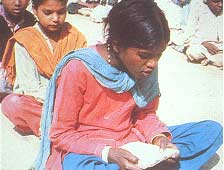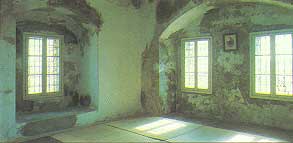
|
|
Abstract: An overview of the Bahá'í Faith, in words and pictures. |
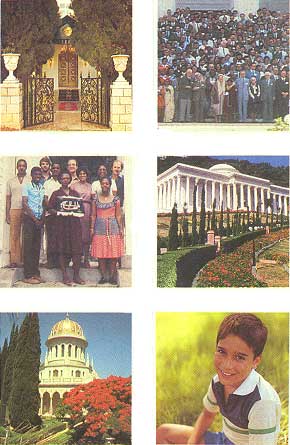
|
THE BAHÁ'Í FAITH
The Bahá'í Faith is the youngest of the worlds independent religions. Its founder Bahá'u'lláh (1817-1892) is regarded by Bahá'ís as the most recent of the line of Messengers of God that stretches back beyond recorded time and that includes Abraham, Moses, Buddha, Zoroaster, Christ and Muhammad. | 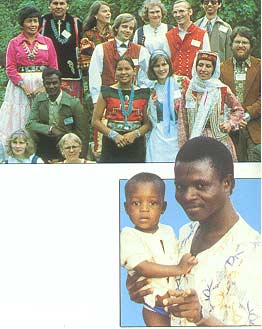
|
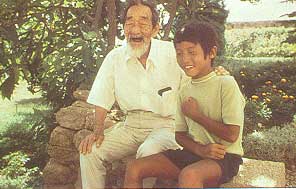 | 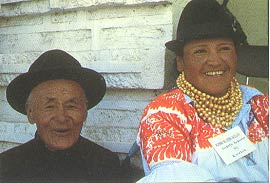
|
|
The central theme of Bahá'u'lláh's message is that humanity is one single race and that the day has come for its unification in one global society. God, Bahá'u'lláh said, has set in motion historical forces that are breaking down traditional barriers of race, class, creed, and nation and that will, in time, give birth to a universal civilization. The principal challenge facing the peoples of the earth is to accept the fact of their oneness and to assist the processes of unification. |
One of the purposes of the Bahá'í Faith is to help make this possible. A worldwide community of some five million Bahá'ís, representative of most of the nations, races and cultures on earth, is working to give Bahá'u'lláh's teachings practical effect. Their experience will be a source of encouragement to all who share their vision of humanity as one global family and the earth as one homeland. |
|
BASIC TEACHINGS OF BAHÁ'U'LLÁH Bahá'u'lláh taught that there is one God whose successive revelations of His will to humanity have been the chief civilizing force in history. The agents of this process have been the Divine Messengers whom men have seen chiefly as the founders of separate religious systems but whose common purpose has been to bring the human race to spiritual and moral maturity. Humanity is now coming of age. It is this that makes possible the unification of the human family and the building of a peaceful, global society. Among the principles which the Bahá'í Faith promotes as vital to the achievement of this goal are
| 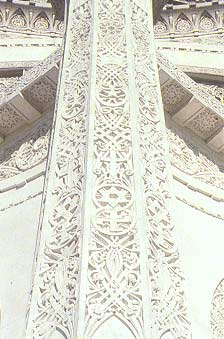 Pillar of Bahá'í House of Worship Wilmette, Illinois, with symbols of four of the major religions.
|
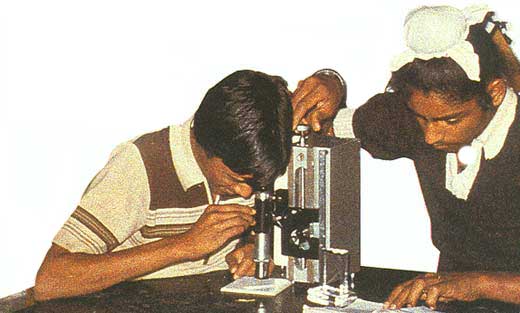 Bahá'í students working with microscopes (Rabbani school, India) | |
| Bahá'ís come from a wide range of ethnic and cultural backgrounds | 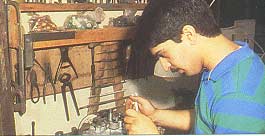 |
|
A WAY OF LIFE Bahá'u'lláh taught that each human being is a "mine rich in gems" unknown even to the owner, let alone to others, and inexhaustible in its wealth. The purpose of life is to develop these capacities both for one's own life and for the service of humanity. Life in this world, as Bahá'u'lláh presents it, is like the life of a child in the womb of its mother: the moral intellectual, and spiritual powers which a human being develops here, with the help of God, will be the "limbs" and "organs" needed for the soul's progress in the worlds beyond this earthly one. The way of life which Bahá'ís seek to cultivate, therefore, is one that encourages personal development. Daily prayer and meditation free the soul from conditioned patterns and open it to new possibilities. | 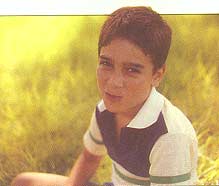
|
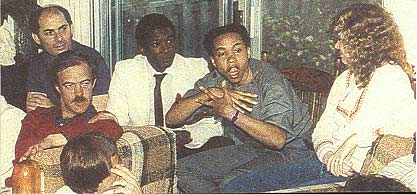 | |
Early believers, men, women and children (Burma)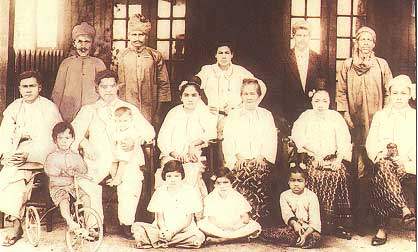 | |
| THE HISTORICAL BACKGROUND For Bahá'ís, evolutionary process is an essential feature of all the phenomena of life including the revelations of God. The series of stages through which their own Faith gradually made its appearance and established itself throughout the world is itself an expression of this principle | 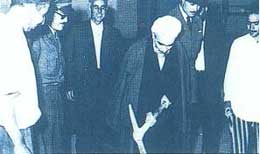 The Shah's army and Muslim leaders join in the destruction of the National Bahá'í Centre, Tehran, Iran, May 1955 The implications of a new stage in the unfoldment of God's will are unwelcome to influential segments of existing society. The Result has frequently been bitter persecution of followers of the new faith. During its first century and a half of life the Bahá'í Faith has passed through several periods of such oppression |
 Bahá'í Conference held at Eliot, Maine, (circa 1930) | |
|
THE BAaacute;B (1819-1850) On 23 May, 1844, in Shiraz, Persia, a young man known as the Báb announced the imminent appearance of the Messenger of God awaited by all the peoples of the world. The title Báb means "the Gate". Although Himself the bearer of an independent revelation from God, The Báb declared that His purpose was to prepare mankind for this advent. Swift and savage persecution at the hands of the dominant Muslim clergy followed this announcement. The Báb was arrested, beaten, imprisoned, and finally on July 9, 1850 was executed in the public square of the city of Tabriz. Some 20,000 of His followers perished in a series of massacres throughout Persia. Today, the majestic building with the golden dome, overlooking the Bay of Haifa and set amid beautiful gardens, is the Shrine where the Báb's earthly remains are entombed. | 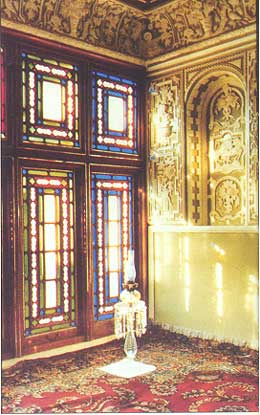 Room of the Báb's home in Shiraz, Iran, where He declared His mission, May 1844 |
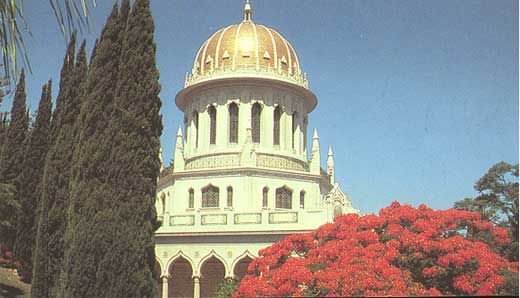 The Shrine of The Báb, Mount Carmel, Haifa, Israel. The site was chosen by Bahá'u'lláh as the focal point of the world centre of His Faith. | |
|
BAHÁ'U'LLÁH (1817-1892) FOUNDER OF THE BAHÁ'Í FAITH Born in 1817, Bahá'u'lláh was a member of one of the great patrician families of Persia. The Family could trace its lineage to the ruling dynasties of Persia's imperial past, and was endowed with wealth and vast estates. Turning His back on the position at court which these advantages offered Him, Bahá'u'lláh became known for His generosity and kindliness which made Him deeply loved among His countrymen. | From Adrianople and later from Acre, Bahá'u'lláh addressed a series of letters to the rulers of His day, that are among the most remarkable documents in religious history. They proclaimed the coming unification of humanity and the emergence of a world civilization. The kings, emperors, and presidents of the nineteenth century were called upon to reconcile their differences, curtail their armaments, and devote their energies to the establishment of universal peace. Bahá'u'lláh passed away at Bahjí, just north of Acre, and is buried there. His teachings had already begun to spread beyond the confines of the Middle East, and His Shrine is today the focal point of the world community which these teachings have brought into being.
|
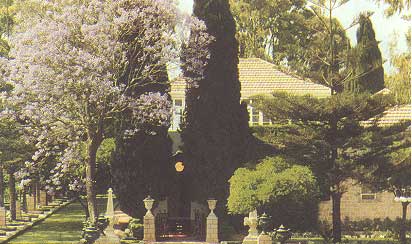 The Shrine of Bahá'u'lláh and the neighbouring mansion, Bahjí | |
|
`ABDU'L-BAHÁ (1844-1921) From earliest childhood `Abbás Effendi, the eldest son of Bahá'u'lláh shared His father's sufferings and banishments. He took as His title `Abdu'l-Bahá, 'The servant of Bahá' Bahá'u'lláh appointed Him the one authorized interpreter of the Bahá'í teachings and as Head of the Faith after His own passing. In `Abdu'l-Bahá was seen a perfect example of the Bahá'í way of life. While `Abdu'l-Bahá was still a prisoner of the Ottomans the first Bahá'í pilgrims from the western world arrived in Acre in 1898. After His release in 1908 `Abdu'l-Bahá set out on a series of journeys which in 1911-1913 took Him to Europe and America, There He proclaimed Bahá'u'lláh's message of unity and social justice to church congregations, peace societies, the members of trade unions, university faculties, journalists, government officials and many public audiences. | 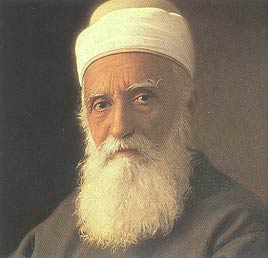 Portrait of `Abdu'l-Bahá `Abdu'l-Bahá passed away in 1921, having consolidated the foundations of the Bahá'í Faith and greatly expanded its reach. The northern rooms of the Shrine of the Báb, where He is interred, are a place of pilgrimage for Bahá'í's visiting the World Centre of their Faith. |
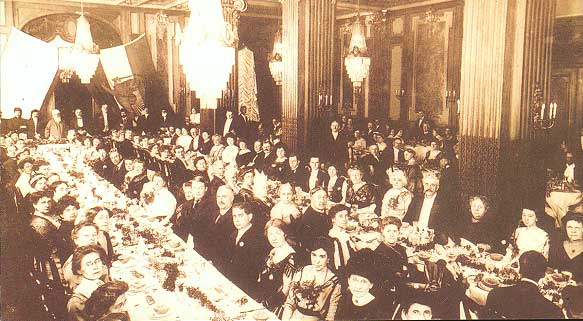 Group photograph taken during `Abdu'l-Bahá's visit to North America, 1912 | |
|
THE UNITY OF BAHÁ'ÍS In order to be effective in promoting world unity the Bahá'í Faith must itself be firmly united. Bahá'í unity has been assured by provisions in the writings of Bahá'u'lláh and `Abdu'l-Bahá that establish authoritative guidance on the intent of Bahá'u'lláh's revelation and on the administration of the affairs of the international Bahá'í community. Throughout the critical first century of the Faith's existence those provisions have protected the Bahá'í community from sectarianism, and have enabled it to adapt itself to the requirements of a rapidly evolving civilization. The institutions which embody this authority are the Guardianship and the Universal House of Justice. | 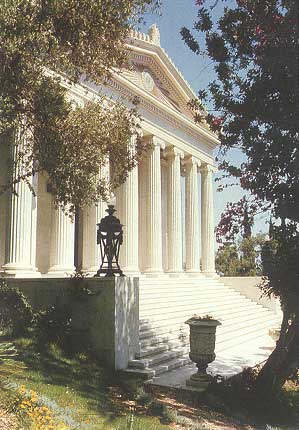 Archives building and gardens Mount Carmel, Haifa |
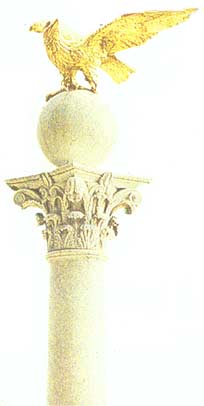 Monument over Shoghi Effendi's grave in London. | THE GUARDIANSHIP `Abdu'l-Bahá in his Will and Testament appointed His grandson, Shoghi Effendi Rabbani, Guardian of the Bahá'í Faith and interpreter of its teachings. Shoghi Effendi served until his death in 1957. During these thirty-six years the Guardian translated many of the writings of Bahá'u'lláh and `Abdu'l-Bahá into English, expounded their meanings, encouraged the establishment of local and national Bahá'í institutions and guided a series of plans aimed at diffusing Bahá'í ideals throughout the world In the Holy Land, the Guardian's enduring memorial is the magnificent setting he created for the World Centre of the Bahá'í Faith. The completion of the Shrine of the Báb was his work as was the construction of the International Bahá'í Archives building. It was also Shoghi Effendi who designed the beautiful gardens at Bahjí and on the slopes of Mount Carmel. |
|
THE UNIVERSAL HOUSE OF JUSTICE The Universal House of Justice, ordained by Bahá'u'lláh as the legislative authority in the Bahá'í Faith, came into existence in 1963. It is a nine-member body elected at five-year intervals by the entire membership of the national governing institutions of the Bahá'í world. The House of Justice directs the spiritual | and administrative affairs of the Bahá'í International Community. It serves, as well, as the custodian and trustee of the Bahá'í Holy Places and other properties in the Holy Land. Endowed by Bahá'u'lláh with the authority to legislate on all matters not specifically laid down in the Bahá'í scriptures, the House of Justice is the institution that keeps the Bahá'í community abreast of an ever-changing world |
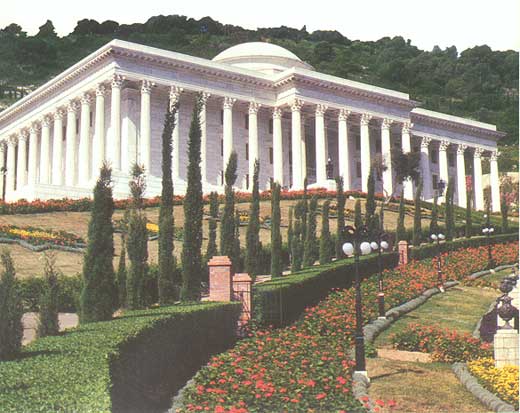 Seat of the House of Justice, Haifa | |
|
THE BAHÁ'Í WORLD CENTRE As is the case with three of the other world religions (Judaism, Christianity, and Islam), it is ties of historical circumstance that bind the Bahá'í Faith to the Holy Land. The houses and other places associated with the exile here of Bahá'u'lláh and `Abdu'l-Bahá have been lovingly restored by the Bahá'í community. Every year thousands of Bahá'í's visit Haifa and Acre as pilgrims and have the privilege of visiting these sites in the company of fellow believers from all parts of the world. At five-year intervals the elected representatives of the national Bahá'í communities gather in Haifa to elect the members of the Universal House of Justice, which administers the international affairs of the Faith from its Seat on Mount Carmel. The staff of the House of Justice comprises Bahá'í volunteers drawn from many different lands. Living in the Haifa/Acre area, staff members serve by invitation for varying periods of time. | 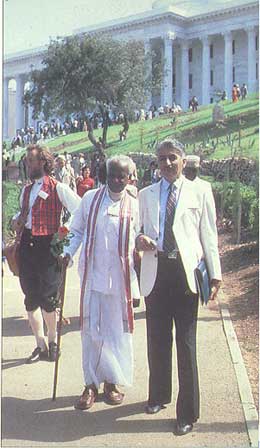 Delegates in front of the Seat of the Universal House of Justice. |
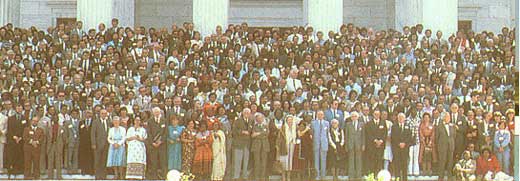 International Convention 1983 | |
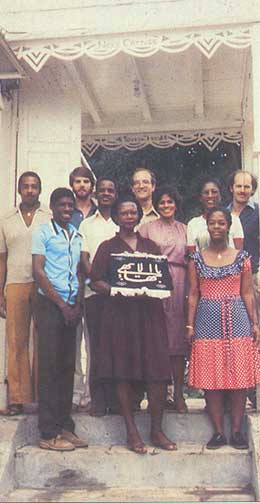 Assembly of St. Vincent and the Grenadines | THE BAHÁ'Í WORLD COMMUNITY The Bahá'í community today numbers some five million members resident in 166 independent countries and 48 territories. Its rich diversity embraces people from most of the planet's races, creeds, and cultures, including over 2100 different ethnic groupings. There is no clergy in the Bahá'í Faith. Because the human race has entered upon the age of its maturity, each individual is able to explore the revelation of God and to decide on the issues of life through prayer, reflection, and consultation with others. To make this possible, the Bahá'í scriptures have so far been translated into some 750 different languages. The same principle applies to the community's collective life. Elected councils designated as Spiritual Assemblies, administer the affairs of the Faith at both local and national levels. All adult believers are equally eligible and election is by secret ballot and plurality vote. The work of the Faith is entirely supported by voluntary contributions from the members. Giving to the Bahá'í fund is regarded as one of the privileges of membership; the Faith does not accept outside contributions. |
|
BAHÁ'Í HOUSES OF WORSHIP Bahá'í Houses of Worship are open to all peoples. Although their architectural styles differ widely, the nine sides and central dome common to all of them symbolize at once the diversity of the human race and its essential oneness. Devotional programs are simple, consisting of prayers, meditations, and the reading of selections from the Sacred Scriptures of the Bahá'í Faith and other world religions. Music is provided by unaccompanied choirs. As conceived by Bahá'u'lláh, the House of Worship is intended as the spiritual centre for various depandent institutions dedicated to scientific, humanitarian, educational and administrative service. |
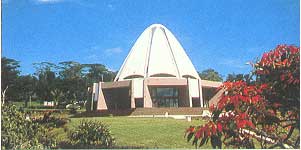 Bahá'í House of Worship Apia, Western Samoa 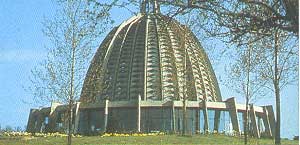 Bahá'í House of Worship Langenhain (Frankfurt) 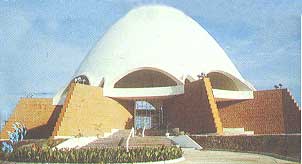 Bahá'í House of Worship Panama City, Panama |
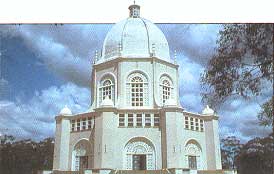 Bahá'í House of Worship Sydney, Australia |
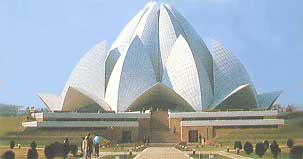 Bahá'í House of Worship Delhi, India |
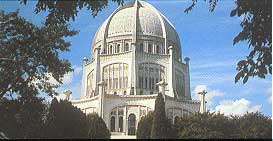 Bahá'í House of Worship Wilmette, Illinois UDA |
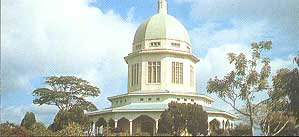 Bahá'í House of Worship Kampala, Uganda |
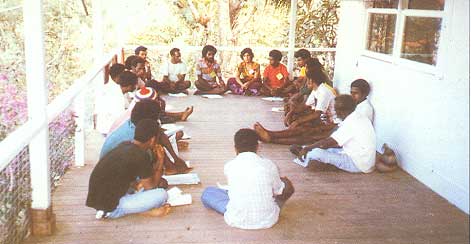 Bahá'í consultative session, Papua, New Guinea | |
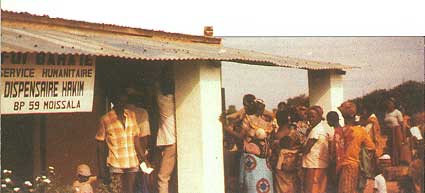 Bahá'í dispensary, Tchad | |
|
SOCIAL AND ECONOMIC DEVELOPMENT From the point of view of social and economic development, the most interesting feature of Bahá'í community life is its unique consultative system. Bahá'u'lláh taught a pattern of group decision-makeing based on a striving for consensus. It would be accurate to say that mose members of the Bahá'í Faith are, to one degree or another, students of the consultative process. The social and economic development possibilities of this system first became apparent early in the 20th century in Iran where Iranian Bahá'í's created their own schools, clinics, and other social services, | including Irans first school for girls Today, development projects proliferate, especially throughout the Third world. They include tutorial schools, local clinics, classes in health care, agricultural projects, reforestation, alcoholism, counselling, and childrens hostels. The community service programming of Bahá'í radio stations embraces not only such practical concerns but also the recognition of native culture. Arising out of the assessment of local needs by locally elected Spiritual Assemblies, Bahá'í development projects are essentially grassroots undertakings. It is no doubt that this fact accounts for the self-sustaining character of so much of the work. |
|
BAHÁ'ÍS AND THE UNITED NATIONS The Bahá'í Faith teaches that true religion promotes unity, and that unity is the fundamental prerequisite for the achievement of global peace. "The wellbeing of mankind", Bahá'u'lláh said, "its peace and security, are unattainable unless and until its unity is firmly established." Among the measures which the Bahá'í community advocates as contributions to world unity are a federation of nations, an international auxiliary language, the coordination of the world's economy, a universal system of education, a code of human rights for all peoples, an integrated mechanism for global communication, and a universal system of currency , weights and measures. Believing that the United Nations presents a major effort in the unification of the planet, Bahá'ís have supported its work in every way possible. The Bahá'í International Community is accredited in consultative status with the United Nations Economic and Social Council (ECOSOC) and with the United Nations Children's Fund (UNICEF). The Community's offices in New York and Geneva | 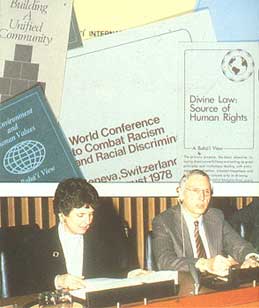 Bahá'í representatives at a U.N. Seminar and Bahá'ís in many lands regularly participate in conferences congresses and seminars concerned with the socio-economic life of our planet. |
|
|
